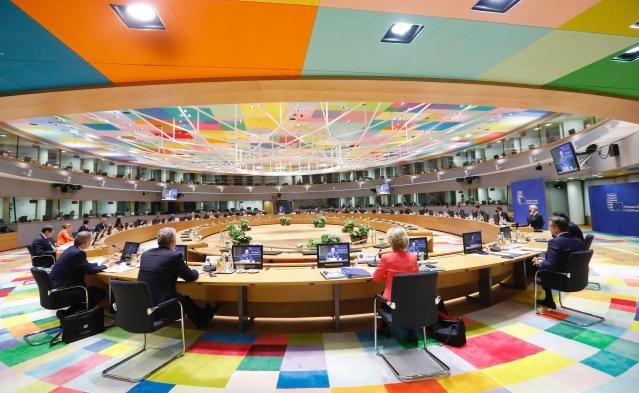The European Council meeting on Thursday and Friday will face both a substantive agenda and critical decisions that will shape EU’s path forward, according to the invitation letter sent by Council President Charles Michel.
In the letter, he first mentions internal matters such as the adoption of the Strategic Agenda which will frame the EU’s priorities and set the EU’s strategic orientations for the next five years. The EU leaders will also determine the way ahead on internal reforms that according to the Belgian EU Presidency’s progress report on the future of Europe should take place in parallel to the enlargement process.
Most interest, however, will be focused on the institutional appointments of the top jobs as presidents of the European Council and the European Commission, and EU’s High Representative for Foreign Affairs and Security Policy, following the recent European Elections.
On external matters, the meeting will kick-off with an exchange with Ukrainian President Zelenskyy. This will be an opportunity to welcome the adoption of negotiating frameworks and the holding of Intergovernmental Conferences with Ukraine, Moldova and Montenegro. “These are historic steps in supporting these countries’ respective path towards European membership.”
Charles Michel writes that the EU “has been ambitious and bold in channeling the extraordinary revenue from immobilised Russian assets to support Ukraine this year”. Furthermore, for the following years, together with partners, the EU will secure loans for Ukraine for an additional EUR 50 billion.
However, most of the €6 billions in the European Peace Facility (EPF) intended for military support to Hungary is still blocked by Hungary and would need to be discussed at the European Council, Only the windfall profits from frozen Russian assets are legally ready for disbursement. €1.4 billion in the course of the next month, and another €1 billion by the end of the year.
“This money will be allocated to Ukraine for three purposes: air defence, ammunition and supporting the Ukrainian industry - overcoming or circumventing this structural difficulty that we have had in the last year and a half,” according to High Representative Josep Borrell at the foreign affairs council meeting earlier this week. The money is not linked to the other EPF money Hungary is blocking.
“It is imperative that we intensify our military support to Ukraine, focusing on air defence, ammunition, and missiles,” Council President Michel underlined. “Additionally, we must continue to rally broad international support for a just peace in Ukraine based on the UN Charter.” The other conflict the European Council will tackle is the Middle East conflict.
The Council will call for the full implementation of the terms of the ceasefire proposal set out in UN Security Council resent resolution on a comprehensive three-phase ceasefire deal to end the war in Gaza, and for respecting and implementing the ruling of the International Court of Justice. The UN resolution is based on US president Biden’s roadmap for peace.
The Council will repeat its call for an immediate ceasefire in Gaza, the release of all hostages and an increase in humanitarian assistance, significant enough to meet the dire needs on the ground.
The Council will also reiterate its commitment to a lasting and sustainable peace in the Israeli- Palestinian conflict on the basis of the two-state solution. Referring to the “day after“, the EU will continue to support the Palestinian Authority and work with all its partners in the region and beyond to revive a process to that end.
The letter does not mention the risk of the spill-over of the war in Gaza to a full-scale war between Israel and Hezbollah and the urgent need to find a diplomatic solution to prevent a war which would be devastating for both Israel and Lebanon. Hezbollah, which acts as a proxy for Iran, threatened recently to attack Cyprus in case of an escalation.
“Threats against one EU member state are threats against the whole of the EU,” commented Peter Stano, EU’s lead spokesperson for foreign affairs.
Do the threats and Hezbollah's support to Hamas affect the EU’s financial assistance to Lebanon following the Commission’s recent agreement with the country? “No, these are unrelated issues,” the spokesperson replied. “The EU assistance to Lebanon is being implemented independently of what is going on between Hezbollah and Israel.”
Among others, the EU plans to support the training and modernizing of the Lebanese army before any political solution has been agreed. “There is an EU commitment enshrined in the Council conclusions, that the EU will support the Lebanese army as an important actor in maintaining peace in Lebanon,” he explained.
According to UN Security Council resolution 1701 from 2006, Hezbollah should withdraw from the south of Lebanon and be replaced by the army.
M. Apelblat
The Brussels Times

